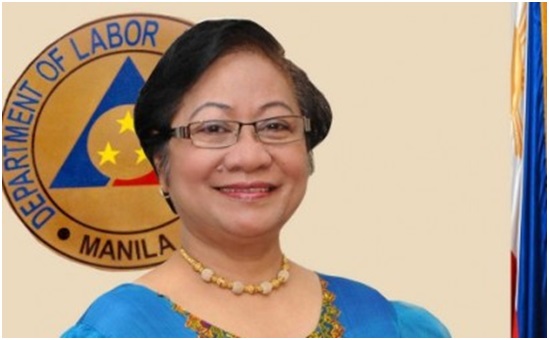Secretary of Labor and Employment Rosalinda Dimapilis-Baldoz issued the statement below following a meeting with Hong Kong Secretary of Labor and Welfare Matthew Cheung Kin-chung at the Hong Kong Convention and Exhibition Center, in Hong Kong, where Baldoz is on a two-day official visit; August 8, 2015.

“I have met with Hong Kong Secretary of Labor and Welfare Matthew Cheung Kin-chung to discuss a host of important issues concerning our overseas Filipino workers in Hong Kong. The meeting took place in the course of a two-day official visit to assess the situation of our OFWs in the Hong Kong Special Administrative Region.
“This is the first time that I have met with Hong Kong’s top labor and welfare official and our meeting was very cordial and encouraging. It was a break-through meeting and provided us the opportunity to exchange views on a range of issues pertaining to our OFWs in Hong Kong who are mostly household service workers.
“I have informed Mr. Cheung of the background of our migration policy and the direction that the Philippines is taking to strengthen the promotion and protection of the safety and welfare of our OFWs, particularly household service workers who are in vulnerable occupation.
“I expressed my sincere appreciation to Hong Kong for hosting close to 180,000 of our OFWs, which is 53 percent of Hong Kong’s foreign household service workers population, and for the Hong Kong government’s continued support to our Philippine Consulate General and the Philippine Overseas Labor Office, especially concerning Filipino household service workers, through the establishment of a technical working group which includes as members representatives of the Labor and Immigration departments and the Employment Agencies Administration which regulates and supervises Hong Kong employment agencies.
“I emphasized that our policy is moving towards a higher level of standards for ethical, fair, and legal migration and for very transparent policies and processes and deploying only quality workers to quality employers in any labor market to ensure high level of protection and welfare.
“During our meeting, I raised the issue of excessive fees and charges in the guise of training fees and the like being collected from OFWs which put them in debt bondage that defeats their purpose of working abroad. I also explained the background of the no placement fee policy being implemented by the Philippines for overseas household service workers, as well as the 2006 Household Service Workers’ Reform Package which I initiated as then Administrator of the Philippine Overseas Employment Administration. I also informed Mr. Cheung that this reform package, including the rules and regulations of the POEA, is undergoing a comprehensive review and being updated to conform to the realities of the times.
“I also raised the concern over the salaries and living conditions of our household service workers in Hong Kong, as well as the need of our OFWs for stronger protection from various abuses by some employers. I also expressed concern on Hong Kong’s two-weeks’ rule and hoped it can be reviewed and extended.
“Mr. Cheung acknowledged the immense contribution of OFWs to Hong Kong in elderly and child care and in releasing/allowing Hong Kong women to join the labor market. He provided me the background of Hong Kong’s policy of protection for foreign domestic helpers and the need to maintain such policy. He enumerated Hong Kong’s labour protection and support services available to foreign domestic workers and said Hong Kong has a comprehensive wage, health, and social benefits coverage for foreign domestic workers. He acknowledged that excessive collection of fees and charges is a mutual concern. He also emphasized that Hong Kong does not tolerate any abuse of foreign workers and said the Hong Kong government is very serious about violations of its laws, rules, and regulations, particularly against women.
“We have discussed possible ways to address these concerns and agreed that both sides should work together in strengthening mechanisms that will lead to solutions of the problems.
“We have agreed to exchange information and intelligence on specific cases and step up collaborative efforts to raise awareness and knowledge of workers, stakeholders, and the public on the migration realities and processes. Both sides committed to provide each other a schedule of allowable fees and charges that will be disseminated to the workers and the public to minimize, if not prevent, abuses. We also agreed to work together to encourage victims to come forward and avail of existing remedies on complaints.
“Mr. Cheung, finally, extended an invitation to convene and host a high-level meeting between labor officials of Hong Kong and the Philippines in the first quarter of next year to build on the progress of collaborative and coordinative efforts and to further discuss matters of concerning household service workers.”